Meet our Vice President for Publications, Thilo Sauter
Prof. Thilo Sauter is known in our IES society as a Vice president for Publications. In this article, you will also read that he turned his own house into a living lab for his research students. Discover a passionate professor, who keeps pace in everything he’s doing: precision clock synchronizing, hiking, ballroom dancing and more…
ITeN team: Dear professor, thanks a lot for being with us today. Please share a bit of your experience with us. Tell us how you chose a career in engineering? Who inspired you?
I happened to have a very good Mathematics teacher at high school, he was very supportive and let me do some computer programing after school and even during class. Back in the early 1980s, we were among the first schools to actually have computers at that time! It was a little bit of a luxury.
I wanted to be a dentist for a while, because I had a dental appliance and I wanted to pay that back to the society. I also had this weird idea to do both Electrical Engineering and Physics in parallel. But after a few weeks in university, I realized that one is more than enough, and I focused on electrical engineering.
It wasn’t a long-planned career, a lot just happened by chance, but I have to say that I am more than happy with it.
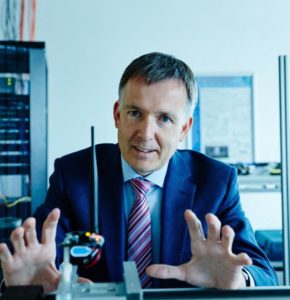
ITeN team: What would be the highlights of your career?
I did a few R&D projects for and together with industry. Not all of them made it into publications, but some of them had some really nice outcomes:
For example, I designed an integrated circuit that actually became sort of a standard device for a company that is the leader in voice communication systems in air traffic management. And I later learnt that our chip was used in about half of the airports of the world to control the communication between the control towers and the aircrafts.
At least for a while, I could say that almost all the air traffic communications actually ran over my chips… Still, I’m confident flying! (laughs)
Another thing I could be proud of is that I was part of a team in university developing a smart sensor for the Volkswagen group that actually made it into series products and moved around on the road in different cars of the Group.
In 2004, I was the Founding Director of the Institute for Integrated Sensor Systems at the Austrian Academy of Sciences. For a few years, we were the world record holders in high precision clock synchronization. And our concepts were the foundation of the new timing infrastructure at the LHC (Large Hadron Collider) in CERN (European Council for Nuclear Research in Geneva). That was quite a nice contribution that made it into in research papers.
I also led one of the very first EU research projects on smart grids, before the term “smart grid” was even coined. Sometimes, in retrospect, you realize that you have been something like a pioneer…
We did some pioneering work for security in automation and the connection of automation systems with the Internet. When we started this 25 years ago, people were laughing at us, asking why anyone would need this. Now security in automation systems is a huge topic.
The nice thing about engineering is that, maybe a little contrary to pure physics, you do not only want to understand how things work, you also want to apply that knowledge. Understanding comes first and then you turn it into something that can be applied, and practice is actually what makes the difference.
ITeN team: What can you tell us about your story in the IES society?
The first time I got in touch with IES was at the 1997 WFCS workshop on Factory communication systems, 25 years ago… last century… last millennium!
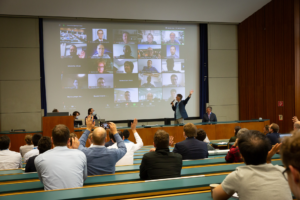
What drives me, not just as a VP, but in all am doing, as an Editor-in-Chief, conference organizer, is to support the community. It’s not so much about personal benefits and adding lines on the CV, it’s more about paying something back to the community.
In research, when we make our first steps in our career, we take a lot from the community. When we publish in journals or go to conferences, we rely on volunteers who do all the organization and the reviews. It is a lot of work, in the evenings, on the weekends, because it’s not part of the paid job. And in the end, volunteers don’t get extra credits or extra pay for that. They can only hope to get some recognition at some point…
But still we should be part of it, it’s a matter of give and take: you take a lot, but you should also give something back to the society.
Therefore I want to provide platforms and opportunities to other people so that they take advantage of being part of the scientific community.
ITeN team: As our IES Vice-President for Publication, what would be your mission in our Industrial Electronics society?
Our IES majorly owned publications are:
- Transactions on Industrial Electronics (TIE),
- Transactions on Industrial Informatics (TII),
- Journal of Emerging and Selected Topics in Industrial Electronics (JESTIE),
- Open Journal of the Industrial Electronics Society (OJIES),
- Industrial Electronics Magazine (IEM),
- IE Technology News (ITeN web site).
My mission is to make these journals more successful, even if they are already. Together with the Editors-in-Chiefs, this means ensuring the quality of papers, a smooth operation of the journals, and also safeguarding them from all kinds of frauds and tricks that people increasingly tend to play.
What we, as VPs, can only do – because the work is done by others – is to set the boundary conditions, make their management as easy as possible, and eventually give a bit of inspiration for new projects.
ITeN team: PRAC review happens every five years – and it happened last year during your term. Can you tell us more about this Periodicals Review and Advisory Committee?
This is a challenge that needs quite a lot of preparation, we had to fill reports, do meetings with the review committee.
Because of the pandemic, all had to happen online with only remote interaction. It was really difficult to discuss when you’re not sitting around the same table.
Also, we were beta testers of a new completely web-based reporting application from IEEE. It wasn’t easy, but it somehow worked in the end.
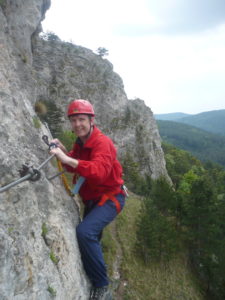
ITeN team: Talking about online meetings during the pandemic – what is your experience?
Online you can do normal day-to-day work but when it comes to being in a creative process, do some brainstorming, develop new ideas, new research proposals, you hardly can do that online.
What is missing in online meetings is the chemistry. If you ever thought there is no such thing like chemistry between people, now – after Covid – you should know better.
Especially with more intricate things that require some diplomacy, it’s better if you can sit around the table, go to the coffee machine, have these informal corridor talks in small groups. Not having these possibilities has made AdCom (Administration Committee) life very difficult these days.
ITeN team: Which advice(s) would you give to boost our reader’s career?
Do what you really have a passion for, it doesn’t matter so much if it is a profession that is really sought after or needed. If you are passionate, then you will have a chance to be really good.
Of course, we can give young people ideas of what they could do, we can help them get interested, but they have to find their passion themselves.
So, my advice is you should listen to yourself.
ITeN team: If ever you manage to get some free time, what are your hobbies?
I like what I am doing for a job, this is a blessing. But it is also a danger because it’s sometimes hard to take me away from my work… especially because I turned my home into a living lab! (laughs)
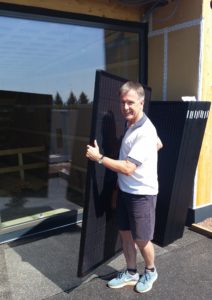
Four years ago, we renovated our 90 years old single-family house. Doing research in renewable energy and smart grids and smart sensors and building automation, I decided to do it right and turn it into a smart home. So, we kicked out the gas heating, installed a heat pump, put photovoltaic panels on the roof and into the façade, a storage battery in the basement, installed smart lighting and shading and additional sensors to monitor the energy consumption or the heating. Ultimately, we now have a house that produces more energy than it needs, which also surprised the architect.
My intention from the beginning was to use my smart home as a living lab in our research projects because we typically do not get enough data because of privacy and security issues. With all the sensors and interfaces, my students can now use the data to build simulation models for research in the new field of energy communities and demand side management. The ultimate idea is to really control some of the parameters in the house. For the students it is an extra motivation if they can play with their prof’s house!
ITeN team: And what do you do when you are not at home?
I like hiking because this is something that clears up your mind. I grew up in the mountains, so I did a lot of hiking. Even weird things like taking the bicycle to go 30km up into the mountains, climb a 3000m peak and ride all the way back in the evening.
There is also this hiking trail dream I already had 30 years ago, going from the eastern end of Austria to the western end, along the central alpine mountain range. It will take some 75 days to do the 1200 kilometers… Maybe I should take a few months of vacation to finally do that.
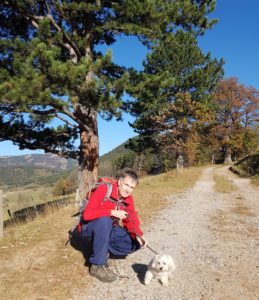
I like Ballroom dancing. Living in Vienna, dance classes are sort of mandatory, it’s a tradition, and of course we have lots of balls. We do the complete program, but I am more into standard dances, not so much into the Latin ones. My favorites are slow fox and tango.
I have a passion for mechanical watches: as a researcher I did high precision clock synchronization to the sub-nanosecond range, in private I have a collection of good old mechanical watches. Apart from a pocket watch from the beginning of the 20th century, the oldest one is an Omega from the 1950’s.
Actually, watchmaker could have been another interesting profession for me.
I am interested in arts and music too. I used to paint and I played violin in an orchestra while I was at school, but when I moved to Vienna, because violin is a pretty loud instrument, I turned to guitar!
ITeN team: Thank you, Prof. Thilo Sauter, for having shared about your inspiring experience with us. Stay tuned, we will soon interview other IES officers…

